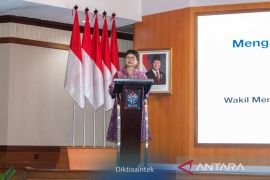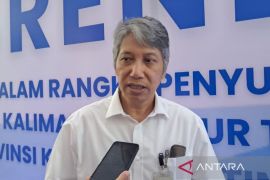In order to temporarily stop civil workers recruitment, three ministers on Wednesday signed a Joint Ministerial Decree (SKB) on the moratorium on civil servant recruitment at the Vice Presidential Office.Jakarta (ANTARA News) - The government has decided to temporarily stop recruiting civil servants to streamline the bloated size of its 4.7 million employee corps as part of its efforts to improve its bureaucracy`s efficiency, effectiveness and productivity.
"The government wants to have a better control of the effectiveness of its personnel expenditure and increase the quality and productivity of civil servants in accordance with the criteria of bureaucratic reform," Finance Minister Agus Martowardojo said.
In order to temporarily stop civil workers recruitment, three ministers on Wednesday signed a Joint Ministerial Decree (SKB) on the moratorium on civil servant recruitment at the Vice Presidential Office. The three ministers were Finance Minister Agus Martowardojo, Minister of State Administrative and Bureaucratic Reform EE Mangindaan and Home Affairs Minister Gamawan Fauzi.
The moratorium will be effective September 2011 to December 31, 2012 but there would still be exceptions for selected areas or positions. The number of civil servants in Indonesia at present is recorded at 4.7 million, or about 1.98 percent of the country`s population.
In 2011 a total of 107 thousand civil servants would enter retirement age while in 2012 the number of retirees would increase to 114 thousand.
According to Minister of State Administrative Reform EE Mangindaan, the moratorium would be implemented in a flexible way as recruitment could still be done in certain areas.
Examples of types of positions for which exceptions could be made were teachers, lecturers, prison wardens and workers in public services.
"It should not happen that a penitentiary has no warden. The number of teachers and lecturers who are retiring is high so that their positions should be refilled," Mangindaan said.
Mangindaan said exceptions could also be made in regional governments which had personnel expenditure below 50 percent of the regional budget, yet this also should be carried out selectively.
"In essence, the moratorium is part of our bureaucratic reform program aimed at reforming the state institutional or organizational structure," the minister said.
Finance Minister Agus Martowardojo said the moratorium was expected to reduce the government`s personnel expenditure burden.
"We will continue to control and keep a watchful eye on personnel expenditure and focus on improving the quality of civil servants. If the required quality and the right corps size are achieved, the productivity of civil servants will automatically increase," Finance Minister Agus Martowardojo said.
He said the decision would be made so that ministries and institutions, including regional governments, would conduct organizational resizing or restructuring so that it would be able to respond to efforts to control personnel expenditure which increased every year.
Data at the Budgetary Directorate General of the Ministry of Finance showed that expenditure for public servants set in the 2011 state budget amounted to Rp180.8 trillion. The figures for civil servants expenditures in the state budget continued to increase from year to year.
In 2005, it was set at Rp54.3 trillion and increased in 2006 to Rp73.3 trillion, in 2007 to Rp90.4 trillion, in 2008 to Rp112.8 trillion, in 2009 to Rp127.7 trillion and in 2010 to Rp162.7 trillion.
"We are still in the second year of the bureaucratic reforms program. We are convinced resizing will be carried out and the quality and productivity of each of civil servants will increase," Agus said.
The minister expressed hope that the efforts would reduce the swelling of personnel expenditure in the regions which indirectly reduce capital expenditure. After all, the capital expenditure was needed to build based infrastructural means in the regions.
For this, the minister will require regional budgets (APBD) to include a 20 percent capital expenditure, if regional governments are willing to increase the allocation of personnel expenditure.
"We will recommend a 20 percent capital expenditure of the regional budget. If they could not provide 20 percent, we will recommend them not to raise their personnel expenditure," the minister said.
It was also mentioned in the decree that all government institutions and agencies were required to submit strategic plans on civil personnel formation for the coming five years. The strategic plans should have been submitted before December 31, 2011.
"If they don`t file a strategic plan, they will not be given budget next year," Vice Presidential Spokesman Yopie Hidayat he said following the signing of the joint ministerial decree at the vice presidential office.
Earlier, Chief Economic Minister Hatta Rajasa said the moratorium which would be imposed beginning in September 2011, would save on regional personnel expenditure. "With the moratorium, more personnel expenditure in the region could be reduced," Hatta said.
He said that by imposing the moratorium the government could increase productivity and reduce the potential burden of civil servants.
Hatta said moratorium had no aim to personnel budget in the 2012 because the budget had been decided. Yet the budget would be used to pay non regular employees or workers, particularly health and educational workers.
"Teachers` pay alone has reached Rp100 trillion because it continues to increase. So admittedly the burden is heavy because teachers` salary continues to increase.
Besides imposing a moratorium on recruitment, the government is also considering streamlining the number of civil servants by among others offering an early retirement.
"The number of Indonesian civil servants is fairly high and may burden the government`s budget to provide salaries, pensions and insurances," Minister Agus said.
As regards, the ministry of finance is now proposing an early retirement program. The proposal is intended to improve the corps` productivity.
"This is not only about cost cutting but it is more about increasing the productivity of civil servants," the minister said.
The ministry also offered a chance to public servants aged between 50 and 55 years to retire voluntarily. (*)
Reporter: By Andi Abdussalam
Editor: Heru Purwanto
Copyright © ANTARA 2011











